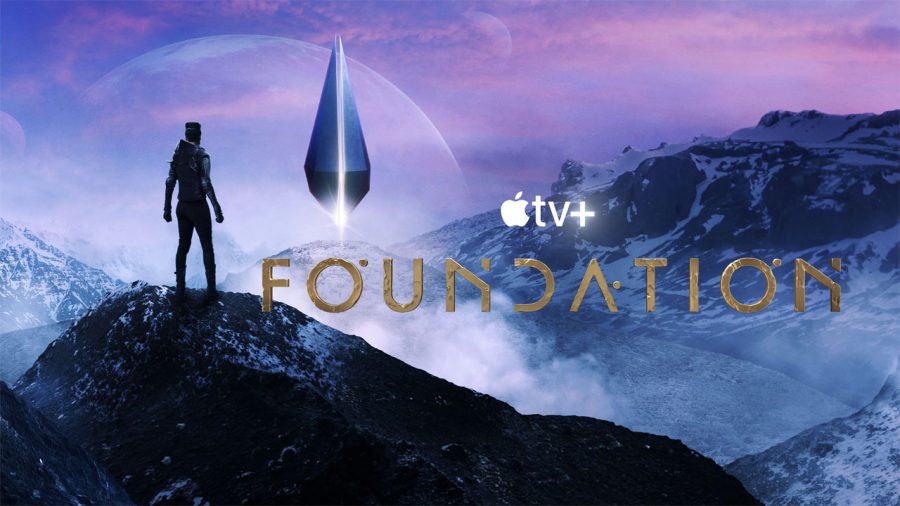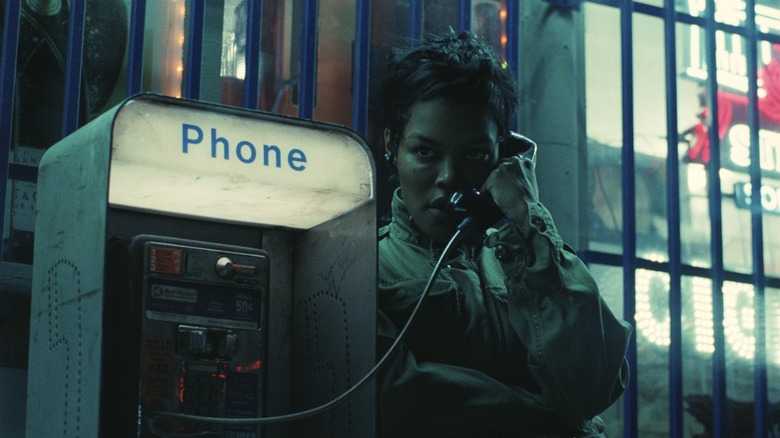“Foundation” creates a strongly developed sci-fi universe which coupled with a stellar cast results in a successful first season.
A colorful and high-quality title sequence was enough to grasp my curiosity when I first started watching Apple TV’s “Foundation.” Clean shots and pristine visual effects transported me off-world to the planet Synnax, where I learned about Gaal Dornick (Lou Llobell) and her gift in mathematics. Given the opportunity to work alongside Professor Hari Seldon (Jared Harris) on the galactic empire’s main planet Trantor, Gaal leaves her home on Synnax only to be thrown into a war of politics. Gaal realizes the true reason she was brought to Trantor was to prove Hari Seldon’s theory of psychohistory, a science he created, which suggests the end of the current Empire is near. Being that the Empire is currently ruled by three clones of Cleon I (the previous ruler of the last galactic empire), each at different stages of life, anything that poses a threat to their eternal rule is blasphemous and dangerous. Thus the order was given to continue Hari’s work to create a “foundation” for the survivors of the presumed catastrophic events to base their continued survival on. Seeing Hari’s prediction come to fruition across 10 fast-paced episodes was like experiencing whiplash as the series jumps around to different tension-ridden events that span across 400+ years.
While the plot may seem confusing and hard to keep track of, as the series went on I began to draw the connections between the seeds of information planted in previous episodes. Because this series is based on a science fiction trilogy of novels by Isaac Asimov, I could tell this show faced the challenge of deciding what to include on screen. Key pieces of information and backstory were told through Gaal’s narration rather than shown which caused some scenes to fall flat. There were also a number of times where scenes would cut or the next episode would start and the feeling that I missed something would gnaw at me throughout the episode; such as in episode 2 when Gaal, Hari, and other followers of the “foundation plan” were suddenly months into their journey of exile to the planet Terminus. Never addressing this time skip was disorienting and leaves one big question mark even after finishing the first season.
With such strong performances from a large cast, no scene was truly disappointing. Whether Gaal was in discourse with Hari over the fate of humanity or the middle-aged version of Cleon was simply sitting at the head of the Empire’s dinner table, I was entranced by the actors’ presence. I admit, at the start, that the character of Gaal Dornick being a math genius seemed to be shoved down my throat. Giving her certain quirks, such as counting prime numbers when she is nervous, jumped out at me as a cringeworthy push to make sure the audience knew she was a student of academia at heart. Leah Harvey’s character Salvor, a warden and soldier on the planet Terminus, brought a much needed sense of humanity to the story as her character’s motives and actions, rooted in defending her family and friends first before serving the Empire, were most relatable. Lee Pace’s acting shone the brightest for me as one man was able to convey many eras of the same person, each with different motivations. There was one scene in episode 2 where Pace delivers a powerful monologue and gives the command to obliterate two civilizations with such poise that I felt chills run down my back as I watched. I can only assume his role as Elven King Thranduil in “The Hobbit” trilogy prepared him well to play someone in a place of power. Even minor characters such as Cleon’s right-hand servant, Demerzel, enhanced the atmosphere, ensuring I was never taken out of the universe I was pulled into.
This show offers everything “Dune,” does and much more. Taking such an involved story and developing it into a series elongated the amount of efficient world building and character development that could be accomplished. High contrasted shots of landscapes and actors complimented the aesthetic of a high society presented to be all-powerful. Ten episodes that span for about 50 minutes join together to make something that feels complete yet leaves you yearning for more. Exploring the idea of revisiting the past to better understand the future through a science fiction story puts the concept of learning from past mistakes into a creative and imaginative space. I also found myself drawing parallels of this fictional universe to climate change and the lack of empathy shown by world leaders today. By the end of the first season I felt fully immersed in the universe creators David Goyer and Josh Friedman translated from Asimov’s books to the small screen and will be eagerly waiting for the recently greenlit season 2.
Grade: A-
Directed by: Rupert Sanders (Episode 1), Andrew Berstein (Episode 2), Alex Graves (Episodes 3-5), Jennifer Phang (Episode 6 & 7), Roxan Dawson (Episode 8 & 9), David S. Goyer (Episode 10)
Starring: Lou Llobell, Jared Harris, Lee Pace, Leah Harvey, Laura Birn
Release Date: Weekly Starting Sept. 24, 2021
Image courtesy of TechRadar.
TV Review: “Foundation”
Nov 28, 2021
0
More to Discover








